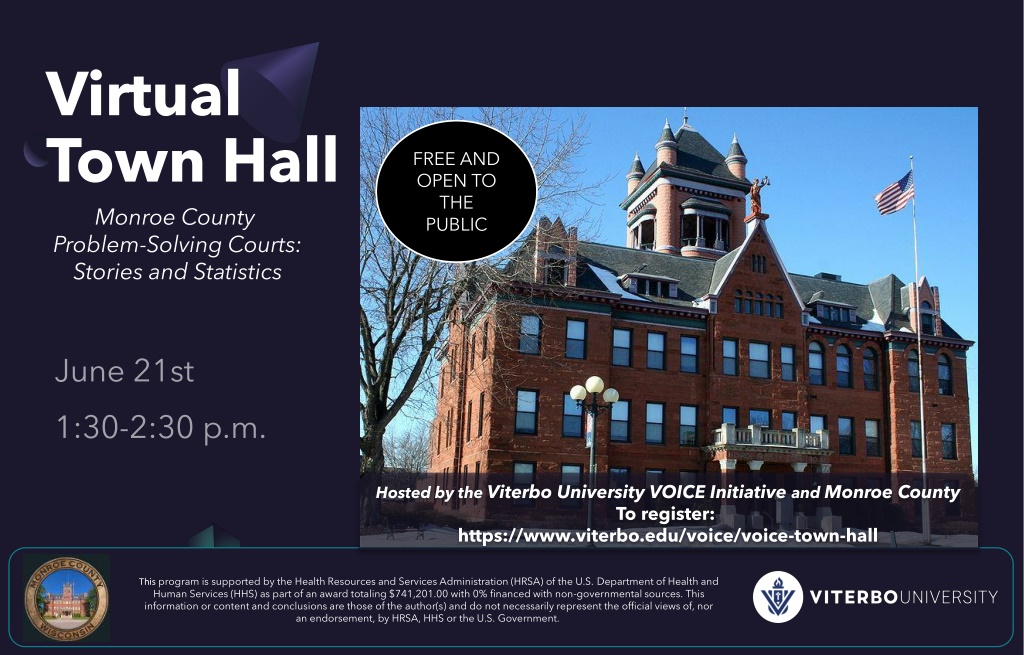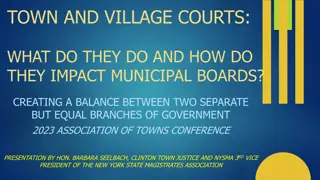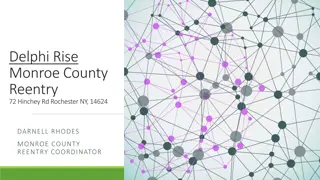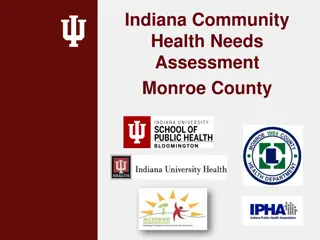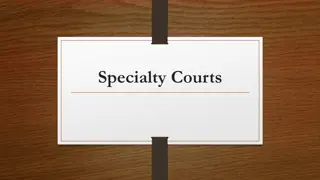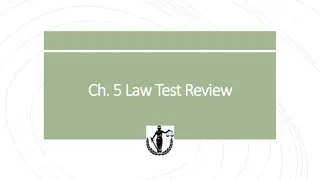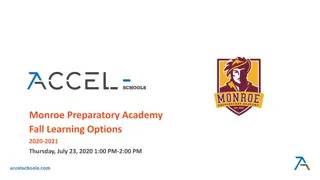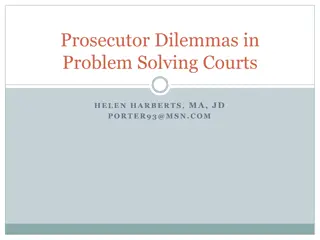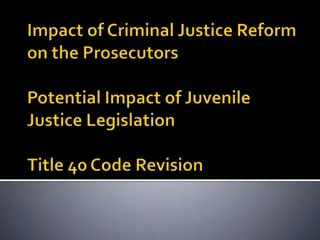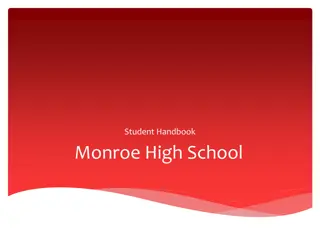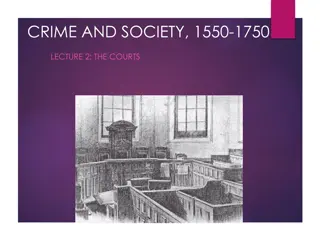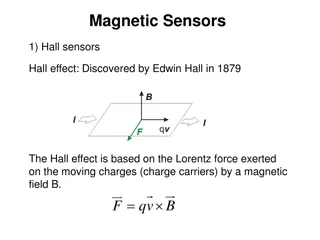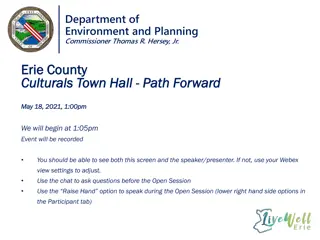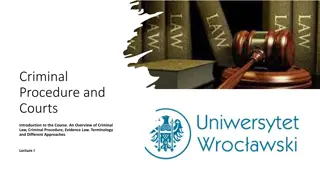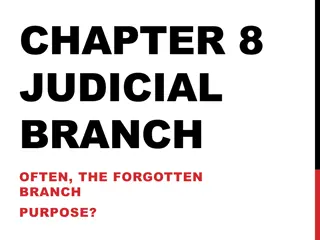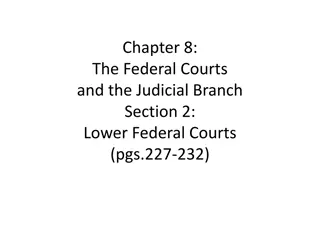Virtual Town Hall Monroe County Problem-Solving Courts: Stories and Statistics
Explore the Virtual Town Hall hosted by Viterbo University VOICE Initiative and Monroe County, focusing on Problem-Solving Courts. Learn about the initiatives, perspectives, and impacts of Drug Treatment Court, OWI Treatment Court, and Family Reunification Court. Gain insights from key figures like Honorable Rick Radcliffe and understand the importance of specialized courts in addressing addiction and criminal behavior.
Download Presentation

Please find below an Image/Link to download the presentation.
The content on the website is provided AS IS for your information and personal use only. It may not be sold, licensed, or shared on other websites without obtaining consent from the author. Download presentation by click this link. If you encounter any issues during the download, it is possible that the publisher has removed the file from their server.
E N D
Presentation Transcript
Virtual Town Hall Monroe County Problem-Solving Courts: Stories and Statistics FREE AND OPEN TO THE PUBLIC Hosted by the Viterbo University VOICE Initiative and Monroe County To register: https://www.viterbo.edu/voice/voice-town-hall This program is supported by the Health Resources and Services Administration (HRSA) of the U.S. Department of Health and Human Services (HHS) as part of an award totaling $741,201.00 with 0% financed with non-governmental sources. This information or content and conclusions are those of the author(s) and do not necessarily represent the official views of, nor an endorsement, by HRSA, HHS or the U.S. Government.
Introductions Overview of Viterbo VOICE Initiative Monroe County Problem-Solving Courts Schedule A justice perspective on court system What are we asking Q & A
Recruit and Support - Recruit 45 Counselor Education students into the VOICE initiative and support them in Practicum- Internships. Viterbo University VOICE Initiative Develop and Expand - Develop and expand internship sites in integrated care settings that serve clients with OUD and SUD and/or at-risk youth in high need and high demand areas. Enhance - learning and provide educational and networking events regarding OUD, SUD and/or children, adolescent, and youth in integrated behavioral health settings.
Monroe County Drug Court Honorable Rick Radcliffe - Monroe County Circuit Court Branch III Tara Nichols - Monroe County Justice Program s Assistant Coordinator Treatment Court Coordinator Robyn McAlpine - Monroe County Drug Court Case Manager VOICE Grant recipient
Introduction to the courts Three problem-solving courts Drug Treatment Court OWI Treatment Court Family Reunification Court
What is a Drug Treatment Court? A Drug Treatment Court is a specialized Court that is an effective tool in treating addiction and changing criminal behavior Team members include: Multi-disciplinary approach
A justice perspective Why do we need a Drug Treatment Court in Monroe County? What is the state of drug- related offenses in Monroe County? What are the impacts of drug use on our families and communities?
Why have a Drug Treatment Court? 20.2 Million Americans (1 in 10) have a substance abuse disorder 43.6 Million Americans (1 in 5) have a mental health problem 8 Million Americans suffer from both disorders 65% of all inmates have a substance abuse disorder 90% of all property theft crimes are drug-related This Photo by Unknown author is licensed under CC BY-NC-ND.
Treatment Courts are successful (Judge Radcliffe) Single Most Successful Intervention in Criminal Justice System Saves lives, improves education, housing, employment and financial stability Promotes family and limits foster care needs About 50%-75% of participants graduate program, which is more than double success rates for probation and general inmate population
Treatment Courts Save Money For every $1.00 invested, Treatment Courts return on average 4 to 12 times that investment Reduced crime and recidivism Reduced incarceration Reduced costs to system Reduced need for services
Every 4 minutes someone is sent to treatment instead of prison through treatment courts Recovery: Treatment and Sobriety Treatment Court Participants are 37% less likely to test positive for illicit substances Treatment Court Participants who graduate with at least 90 days of sobriety have a 164% greater reduction in recidivism
Monroe County Statistics DA s office reports a 400% increase in the number of drug charges from 2011 to 2018 41% of new cases are repeat offenders In 2020 51% of charged drug possession cases were referred to the Monroe County Drug Court. 50% of Department of Corrections ATR s were referred to Drug Court 40 referrals received since inception, 52% accepted into program Currently 13 active participants
Mission Statement By providing intensive monitoring, individualized treatment, and comprehensive services to substance dependent offenders, the Monroe County Drug Court will enhance public health and safety, reduce recidivism, and enable participants to break the cycle of addiction.
Judge Rick Radcliffe Coordinator Tara Nichols Case Manager Robyn McAlpine Sheriff Dept. Lt. Ryan Hallman Team Members Probation Agent Michelle Jaeger Public Defender Russ Hammer District Attorney Kevin Croninger Treatment Professional Barb Barghahn Dept of Human Services Emily Nolte
The Community Drug Court Team will solicit guidance from community members and Advisory Panel Success depends on cooperation along all levels of criminal justice system, including law enforcement, social workers, clerk of courts, prosecutors, defense counsel, probation, treatment providers, community leaders and local business
Program Components Eligibility Criteria & Referral Process Phases/Program Structure Status Hearings Incentives & Sanctions Community Supervision
Overview: Role of Treatment Continuum of care Team Representation Evidence-Based Practices Treatment Modalities Provider Training and Credentials Client Autonomy Dosage and Duration Case Management Barriers
Program completion is key Long-term reduction in recidivism An evaluation of the Multnomah County (Portland, Oregon) Drug Court found that crime was reduced by 30% over 5 years, and effects on crime were still detectable an astounding 14 years from arrest. Improved quality of life Reduction in mental health symptoms, substance use reductions, greater participation in prosocial activities (school, employment, community service, family relationships)
Successes IN 2014, AT LEAST 25,049 PARTICIPANTS GRADUATED FROM US TREATMENT COURTS. THE AVERAGE GRADUATION RATE IS 59%(50% TO 70% RANGE).
Questions? Any future questions can be directed to: Tara Nichols, Monroe County Justice Programs Assistant Coordinator tara.nichols@co.monroe.wi.us Phone: (608) 269-8821 Fax: (608) 269-8894
The ask (Judge Radcliffe) Increasing support and understanding Direct - Donating time, peer support/recovery coach services, organizational support- community service-hiring-vouchers Indirect See the person rather than the addiction
